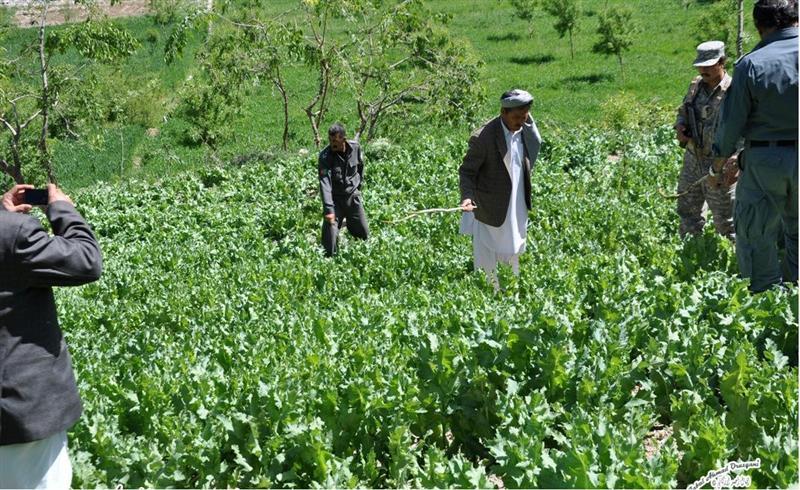KANDAHAR CITY (Pajhwok): So far about 400 hectares of land have been cleared of the poppy crop as part of an ongoing eradication campaign in southern Kandahar province, an official said on Saturday.
The campaign launched a month back in Zherai and Maiwand districts was on Saturday extended to the Panjwai district, said Gul Mohammad Shakran, the provincial Counternarcotics Department head.
He told Pajhwok Afghan News the crop had been sown in Zheri, Panjwai, Maiwand and Shah Walikot districts and the cultivation had dropped to zero level in other districts of Kandahar.
He said the campaign was focused on the three districts where the banned plant’s cultivation was widespread as compared to other towns.
He said the campaign was extended to Panjwai’s Zangabad area, previously the scene of fierce clashes between insurgents and security forces. The district is now under government’s control.
The official said poppies were destroyed this year in many areas of several districts, where launching such a campaign had been impossible over the past 13 years due to insecurity.
The campaign, involving personnel from the national army and police, was going well and had been without any untoward incident so far. Shakran said security forces suffered heavy casualties during a similar campaign last year.
He said the Ministry of Counternarcotics had set them the target of eradicating the illicit crop on 2500 hectors of land, but they had so far cleared 400 hectors of land.
He said if the ministry concerned provided them all needed equipment and facilities in-time, they would be able to completely destroy poppies in the four districts.
Lal Mohammad, a resident of Zangabad area, said: “We are not happy to grow poppy crop, but we have no other option because we lack enough water and market for other crops.”
He said growers had spent a lot of money to cultivate the poppy crop in their fields, but security forces destroyed them today (Saturday).
The resident said farmers would never cultivate poppy crop in their fields if the government provided them with alternate economic resource, irrigation water and access to market.
But officials in Zheri and Panjwai districts said construction works on rivers, canals, water reservoirs and retaining walls were ongoing under the Food Zone Programme as per the wishes of local populations.
They hoped completion of the projects would help discourage poppy cultivation in the two districts.
Zheri district chief, Haji Jamal Agha, told Pajhwok Afghan News that poppy crop cultivation had declined in the district as a result of the impact of the extension of government’s writ and the Food Zone Programme.
The United States Agency for International Development (USAID)-funded Food Zone Programme is being implemented in two years at a cost of $20 million.
Initiated in Kandahar City, Dand, Daman and Arghandab, the programme is currently focused on Zheri, Panjwai, Maiwand and Shah Walikot districts, where the poppy crop is largely cultivated than other districts.
The acting governor had previously criticized the government’s counternarcotics strategy as irresponsible, saying the ministry concerned had not been able to amicably discharge its responsibility in this regard.
He had said the Ministry of Counternarcotics had spent millions of dollars to eradicate poppy crops, but did not provide alternate income support to farmers and equipment required in this regard to the provincial administration.
Due to easy access to drugs, nearly 100,000 people are addicted in Kandahar, with each addict spending one dollar a day on the illegal substance.
ma/mud








GET IN TOUCH
NEWSLETTER
SUGGEST A STORY
PAJHWOK MOBILE APP